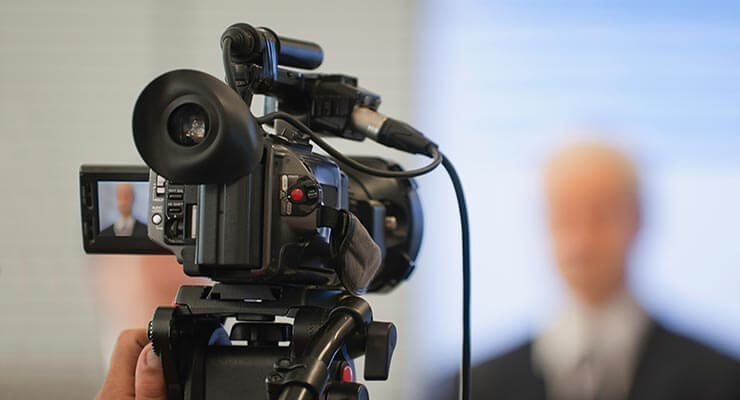The Duty of Lawful Videography in Depositions and Tests
Lawful videography has actually emerged as a crucial tool in both depositions and tests, giving a multifaceted technique to documenting witness testimonies. As legal professionals significantly recognize its worth, it motivates a much deeper exam of exactly how these aesthetic documents can influence juror perceptions and trial end results.

Relevance of Lawful Videography
Legal videography plays a crucial function in the documentation and discussion of depositions and trials. This specialized area combines technical skills with legal knowledge to create a reputable document of procedures that can significantly influence case outcomes. The aesthetic element of legal videography improves the understanding of witness testimony, permitting jurors and judges to observe not only the spoken words yet additionally the temperament, feelings, and body language of the witnesses.
In addition, lawful videography offers an objective account of occasions, minimizing the potential for false impression that can accompany created transcripts alone. This aesthetic documentation serves as a vital tool during test discussions, facilitating a more clear and more convincing narrative for both plaintiffs and accuseds. The capability to replay video sections during court process allows legal teams to highlight essential factors, strengthening their disagreements efficiently.
The value of lawful videography expands beyond the courtroom; it additionally plays an essential role in preserving evidence for future referral, whether for appeals or additional lawful action. Therefore, its integration into the legal procedure is necessary for making sure a fair and precise depiction of the facts, ultimately adding to the pursuit of justice.

Process of Legal Videography
While catching the nuances of depositions and trials, the process of legal videography entails numerous important actions that ensure top quality, precise recordings. A professional legal videographer prepares by evaluating the situation materials and recognizing the certain requirements of the deposition or trial. This preparation consists of acquainting themselves with the participants and the context, which helps in capturing relevant information.
On the day of the recording, the videographer establishes up the essential devices, which generally includes high-definition video cameras, microphones, and proper illumination. Making sure optimum angles and sound quality is crucial, as it directly affects the efficiency of the recording. The videographer connects with lawyers and individuals to develop procedures, making sure that every person comprehends the recording procedure.
Throughout the deposition or test, the videographer diligently videotapes the procedures, paying attention to both spoken and non-verbal cues. This includes catching the attitude and responses of witnesses and attorneys. After the session wraps up, the videographer may modify the video for clearness and conformity with legal requirements, creating a last product that precisely mirrors the procedures for future reference and usage in legal contexts.
Benefits in Depositions
The consolidation of videography in depositions uses various advantages that boost the total procedure of gathering proof. One main benefit is the ability to record witness testaments with visual and acoustic integrity, providing a more precise depiction of the witness's temperament, tone, and body language. This multidimensional approach permits lawyers and courts to assess trustworthiness extra efficiently than traditional written records alone.
In addition, videographed depositions work as a powerful tool for preserving testament. Must a witness become not available for test, their tape-recorded deposition can be played in court, ensuring that their proof remains easily accessible and relevant. This facet significantly minimizes the risk of losing essential info that can impact case end results.

Finally, videography improves the total professionalism of the deposition procedure, instilling confidence in customers relating to the thoroughness of their lawful representation (legal videography). By leveraging modern technology, attorneys can considerably improve the effectiveness of depositions
Effect On Tests
In several tests, the assimilation of videography can dramatically affect the presentation of evidence and the jury's understanding. Lawful videography catches witness testimonies and vital evidence in a vibrant style, enabling jurors to involve with the product on multiple degrees. This visual element enhances the narration element of a test, giving context and emotional vibration that traditional text-based evidence might lack.
In addition, video recordings can function as effective devices for impeachment during cross-examination. When disparities arise between a witness's prior statements and their court statement, video clip proof gives an unbiased reference that find can sway jurors' point of views. This immediacy and quality can strengthen the trustworthiness of a party's narrative while simultaneously threatening opposing arguments.

Future Trends in Legal Videography
As we look toward the future of legal videography, several emerging patterns guarantee to reshape its role within the court. One considerable trend is the combination of artificial knowledge (AI) in video clip analysis and editing and enhancing. AI can enhance the process of recognizing vital moments in taped depositions, enabling attorneys to rapidly access relevant content, thereby boosting effectiveness in instance prep work.
Additionally, the increase of online reality (VR) and augmented truth (AR) modern technologies is anticipated to transform how jurors experience proof. legal videography. By immersing jurors in a simulated setting, these technologies can offer an extra extensive understanding of complex situations, leading to even more educated deliberations
In addition, the boosting need for remote depositions, increased by the COVID-19 pandemic, will likely proceed. Legal videographers will certainly need to adapt to brand-new software program and platforms to make sure premium recordings in virtual setups.
Finally, the expanding emphasis on data safety and security will necessitate stricter methods for storing and sharing video evidence. As the legal landscape develops, lawful videographers should stay abreast of these patterns to maintain their relevance and effectiveness in the judicial process.
Conclusion
In summary, lawful videography offers an essential go to this site function in the judicial procedure, boosting the stability of depositions and trials. As technology proceeds to advance, lawful videography is poised to more change its role within the lawful landscape.